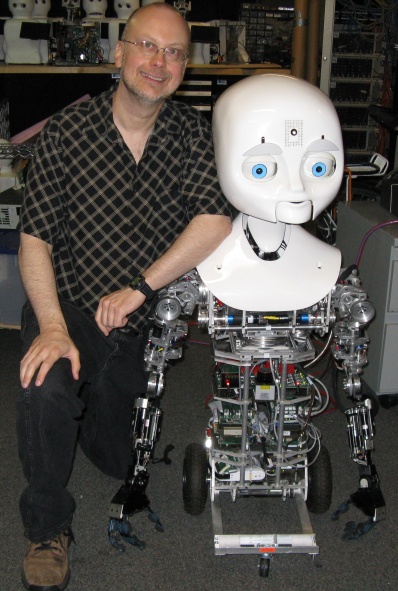Robot caregivers
by Rob - August 31st, 2011.Filed under: Uncategorized.

I was recently asked by a journalist from Fox News Online for my thoughts about robot caregivers for the disabled, resulting in this brief article. But, as always in an interview, I sent him much more material than was actually used. Here are my fuller thoughts on the matter:
Absolutely robots will play a major role as caregivers for the disabled — and I don’t think it’ll be that many years in the future, either. The problem with a human caregiver is that he or she requires infinite patience and infinite kindness. We’ve all read the horror stories about the abuse of the disabled — they come mostly from harried workers snapping under the pressure. A robot won’t have that problem; it will simply perform its task reliably over and over again.
Also, this is liberating for the person being cared for. A human being feels helpless when he or she has to ask another person to get something off a high shelf for them, or help them with their hygiene. But we don’t feel we’re imposing on robots; we’re empowered when we have one. A robot is just another tool, like a wheelchair — but it’s a life-changing tool that improves the quality of one’s existence markedly.
Ironically, the Americans with Disabilities Act of 1990, which was designed to help humans, did just about everything needed to be done to support robots in our day-to-day lives, too. Robots are mobility-impaired compared to most humans: they need ramps and elevators to get around, and thanks to that wonderful bit of legislation, they already have them.
I actually wrote a short story on this theme called “Uphill Climb,” which was published in Amazing Stories in March 1987, although I did it in reverse — if you make the world accessible for robots, you also make it accessible for people in wheelchairs.
There are no downsides to robots helping the disabled — in conjunction, of course, with loving human support, too; this is totally a triumph of technology — a problem that’s long needed solving that we’re finally on the verge of being able to solve.
Photo: Robert J. Sawyer and friend at MIT’s robotics lab
Robert J. Sawyer online:
Website • Facebook • Twitter • Newsgroup • Email


August 31st, 2011 at 3:10 pm
My wife is disabled in a wheelchair. While I can easily see some of the values of such robotic avatars, I might pause before agreeing with the Fox News article saying that “they will be as accepted as wheelchairs and handicapped parking”. In our experience, while needing access seems to be TOLERATED in most cases, its seen more as something businesses are required to do, not so much what they want to do to provide for their customers.